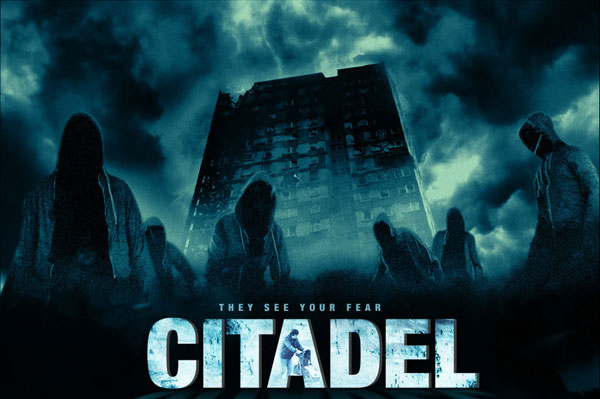Citadel

Daniel Barber’s Harry Brown painted a picture of modern Britain where anti-social behaviour swelled and multiplied in society’s lower classes. It created an almost post-apocalyptic version of the country where unexplained and unnecessary violence was waiting around every corner as inevitable and inescapable as taxes. Regardless of how true to reality this world is, Citadel takes the idea and stretches it to an absurdly bleak and grim breaking point. Amidst rotting tower blocks and condemned landscapes, that look like leftovers from some collapsed totalitarian empire, creep not your bog-standard hoodie-clad anti-socialites. Here we’re dealing with literal feral, faceless demonic monsters. You’d be tempted to describe this as some social allegory smashed into a psychological horror, if not for the fact that both the sociology and horror at work are so flimsy.
The film opens with Tommy (Aneurin Barnard), helpless to stop a pack of feral youths brutally attacking his pregnant wife with a dirty syringe as they leave their recently condemned tower block (the titular Citadel). Grief-stricken, Tommy finds himself lumbered with a crippling sense of agoraphobia. Barnard plays Tommy as a permanently wide-eyed, breathless bag of twitching nerves, utterly terrified of everything happening around him. It’s a good performance, but one feels increasingly frustrated with his behaviour, pleading with him to get a little spine for the vast majority of the film. (He also looks rather like Frodo Baggins.)
It’s not long before Tommy is being stalked by the feral youths. There’s a liberal and understanding nurse, Marie (Wunmi Mosaku), who tries to help Tommy, assuring him that “the kids are probably victims as well”. As the sole voice of reason and kindness in the movie, her days are numbered from the outset.
The first two thirds of the movie attempt to cultivate a sense of psychological dread, to varying degrees of success. The constant colour palette of greys and carcinogenic yellows are a potent environment for Tommy to unravel within, though the third act falls into predictable horror movie cliché as Tommy is taken under the wing of an insane priest as we stumble into a clunky finale.
Though a commendable effort in many senses, filmed beautifully and with an effectively creepy minimal score, the film just never manages to quite worm its way into that place in the back of the mind where a horror needs to ferment to be fully effective. The priest informs Tommy that these monsters can only see those that fear them; they’d probably be seeing a great deal of empty cinema screens if that were the case.
Jonathan Day
Citadel is released nationwide on 3rd March 2013.
Watch the trailer for Citadel here:























Facebook
Twitter
Instagram
YouTube
RSS